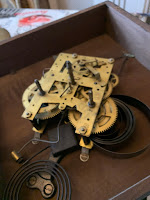Of time, marker events and arriving at work on a lilo
"Time is what keeps everything from happening all at once" -
(attributed to either Mark Twain or Einstein but neither are well supported).
As I slip easily into my 6th month of retirement I have found myself spending far too much "time" thinking about time as a concept. My days are currently a mix of
- time dragging (not helped by current lock down for COVID19),
- time standing still - engaging in activities/occupations that enable me to lose all track of time and
- time speeding by - not having segments imposed by other's timetables (teaching, meetings, meal times, getting up and going to bed etc means I have very few marker events in a day).
Therefore I'm finding that measuring time in retirement becomes a little different.
I really wanted to follow this intelligently but as soon as String Theory was mentioned I thought of Sheldon and The Big Bang Theory tv show and my concentration lapsed. What I did get from this is that we have no choice but to go forward in time and no choice about where we are in time.
In this modern age we take time for granted, always there marking out our days and giving structure to our daily activities. We have created social constructs on how time should be measured and controlled, suggesting that time has limits (whilst also having an eye on eternity - a dichotomy of the modern age perhaps?). It wasn't until 1883 when the railroads needed to have a standard way of keeping time that time zones were created (click on the highlighted text for more) .
We move clocks forward and backwards with the seasons, we create calendars that represent rather than accurately reflect the earth year (those of you that read my Christmas blog will have seen a little about this). Little snippet: 1 day on earth =29 days on the moon. We rely heavily on the clock to tell the time rather than other sources (nature, the sun and moon) and we use diaries, alarms etc to anchor us in the now and plan ahead. These are useful for day to day management of time and for planning ahead, but in retirement I am finding that I do not need to use such tools with such regularity as I did. I am, instead, finding that I want to mark time more longitudinally (not sure if that would be the correct phrase).
The Celts believed that time is eternity in disguise and embraced each day as a sacred space (John O'Donohue). The symbol of the Celtic knot reminds us of eternity and to savour the moment. I want to be able to savour the moment and spend each day as an experience rather than always looking forwards to the next marker event. However, memory can be a time marker and one which I seem to use more frequently. I find that I often think back to my parents at the age I am now in order to make comparisons. How old was I when they were the age I am at now?, how did I view them?, what were they doing?. In what some might suggest is a perhaps maudlin approach, I also count the years of life my Mum had left to her (at my current age) and and think about my own mortality.
So, currently I measure my days by productivity - what did I achieve today? By natural response (am I hungry/tired etc) and by developing a stronger sense of self (past and future) alongside the generations and narrative of my family.
I am learning to savour the moment but tinged with that ever watchful eternity and actually quite enjoying it.



Comments